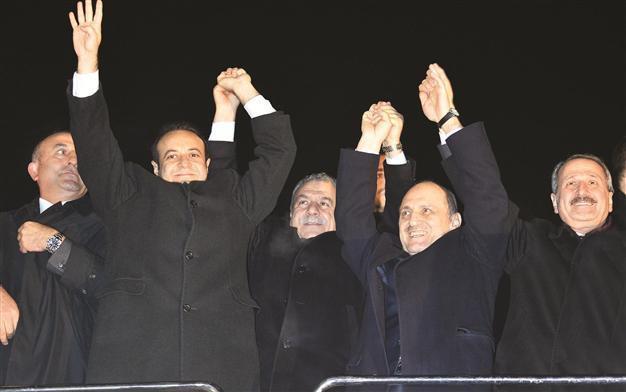Parliamentary panel refuses to send former ministers to court over graft claims
ANKARA

Former Economy Minister Zafer Çağlayan (L), former EU Minister Egemen Bağış (R), former Interior Minister Muammer Güler (2R) and former Environment Minister Erdoğan Bayraktar (2L) have faced accusations of bribery and influence-peddling. The commision rejected the trial demand by nine votes to five.
A parliamentary inquiry commission has voted not to send four former ministers engulfed in the massive corruption and graft operation launched on Dec. 17, 2013, to the Supreme Council for trial, while controversially deciding to destroy the primary evidence of the case.The deputies voted nine to five to not send the four ex-ministers to the Supreme Council, with the nine votes all coming from ruling party deputies.
Following the Jan. 5 vote, Hakkı Köylü, the commission’s chair from the AKP, said the commission would draft its detailed decision, with opposition deputies drafting their own dissenting opinion.
Both the detailed ruling and the dissenting opinion will be sent to the Parliament Speaker’s Office by Jan. 9 at the latest, Köylü said. Upon receiving these documents, the parliamentary speaker will have to publish and send them to the General Assembly within 10 days, he added.
Despite the vote in the commission, a majority of whose members were from the ruling Justice and Development Party (AKP), the quartet could still be sent to the top court following a final vote in Parliament’s General Assembly after the commission submits its report.
The panel’s decision created uproar in the main opposition party.
“What we have witnessed is an operation to cover up Turkey’s biggest corruption probe,” said Levent Gök, deputy parliamentary group leader of the Republican People’s Party (CHP). “This decision does not clear the former ministers,” he added.
“The issue will now come to Parliament, where we will see if the AKP lawmakers will vote on orders from the party executives or with their conscience.”
What infuriated the opposition deputies even more was the panel's decision to destroy the wiretapped phone call recordings, which were the main evidence of the case.
"The panel chair quickly announced at the end of the session that the recordings of phone calls between the former ministers and their [implicated] sons will be destroyed. I asked him to repeat this decision for it to be officially registered," the Nationalist Movement Party (MHP) deputy Mesut Dedeoğlu said.
"I told him that even they will close this file now, it will be opened after years and these recordings will be needed then. Our grandsons will call us to account, asking why we destroyed the evidence," he added.
Erdal Aksünger, a panel member from the CHP, said the official transcripts of the recordings will be put into paper shredders. "This is spoliation of evidence, because these are phone calls wiretapped through a court order. Today's decision is illegal," he argued.
The parliamentary inquiry commission was set to vote late Dec. 22, 2014, on whether to send the four former ministers involved in Turkey’s Dec. 17 and 25, 2013, corruption probes to the Supreme Council, which only hears cases against Cabinet ministers and other top officials. However, the vote was delayed until Jan. 5.
Former Economy Minister Zafer Çağlayan, former EU Minister Egemen Bağış, former Interior Minister Muammer Güler and former Environment Minister Erdoğan Bayraktar have faced accusations of bribery and influence-peddling. All four have been cleared judicially of any wrongdoing.
The commission featured nine lawmakers from the AKP, four lawmakers from the main opposition CHP and one lawmaker from the MHP. One member of the commission from the Peoples’ Democratic Party (HDP) withdrew earlier, citing a court’s ban on publishing the testimonies at the panel.
At the Dec. 22 session, Çağlayan, Bağış and Güler filed written objections to reports displaying the growth in their wealth which were prepared by experts at the Financial Crimes Investigative Board (MASAK), eventually leading to the delay.
A day before the Dec. 22 session, Prime Minister Ahmet Davutoğlu vowed that he would display zero tolerance for corruption, saying the authorities would “cut off the arm” of anyone involved in graft “even if it is our own brother.”
According to speculation, there were two different tendencies within the AKP. The first view, which is shared by Davutoğlu, maintained that sending the former ministers to the top court would benefit the AKP in the run-up to parliamentary elections in June because it would provide an opportunity for the figures to absolve themselves. Supporters of this view also believed that the absence of any judicial process would cast a shadow over the entire party even if the former ministers are innocent.
According to the second view, which is reportedly defended by President Recep Tayyip Erdoğan, the prosecution of the ministers would harm the party’s oft-repeated line that both the Dec. 17 and the Dec. 25 probes were actually part of a coup plot hatched by followers of the U.S.-based Islamic preacher Fethullah Gülen that aimed at toppling the government.
















